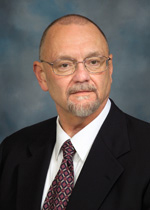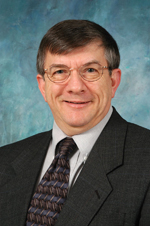 |  |
Thomas Rosenquist, Ph.D. | David Crouse, Ph.D. |
The forum will be held on Nov. 28 from 6:30 p.m. to 9 p.m. CDT. It will be broadcast live from the UNMC Durham Research Center Auditorium in Omaha via satellite to Atkinson, Broken Bow, Chadron, Columbus, Grand Island, Harrison, Hastings, Holdrege, Kearney, Lincoln, Lynch, Norfolk, North Platte, Osmond, Red Cloud, Rushville, Scottsbluff, Sidney, Valentine and Wayne.
It will also be available at Omaha’s Clarkson West Medical Center, 144th and Center streets, Suite 200.
Those with the satellite downlink capability can tune in to the series on Nebraska Satellite System 2, Channel 102.
UNMC’s experts in stem cell research will outline the subject’s history and explain the difference between embryonic and adult stem cells, including their function and potential.
UNMC presenters will be Thomas Rosenquist, Ph.D., vice chancellor for research and professor of genetics, cell biology and anatomy; and David Crouse, Ph.D., associate vice chancellor for academic affairs and professor of genetics, cell biology and anatomy.
Dr. Rosenquist will give an overview of stem cells titled, “A Primer.” Dr. Crouse’s talk is titled, “Separating Fact from Fiction.”
The final presentation will be a panel discussion moderated by Dr. Rosenquist titled, “Your Questions Answered.”
|
|
“There’s enormous hope that embryonic stem cells can be used in the future to treat terrible diseases such as emphysema, spinal cord injuries, heart disease, diabetes, liver and kidney disease, Parkinson’s disease and several other neurodegenerative diseases,” Dr. Crouse said. “Studies in animal models have shown pretty remarkable properties for embryonic stem cells in terms of potential therapeutic use.
“We’re very early in the process of understanding these cells and knowing how they may be used most effectively. There may also be new potential therapeutic uses for adult stem cells. There is still much to learn.”
Embryonic stem cells, which were first isolated in 1998, come from human eggs that have been fertilized in a laboratory for in vitro reproductive procedures. Unused embryos often are discarded, or donated for research with informed consent. Embryonic stem cells, in the pre-implantation embryos, are the foundation for cells for organs and tissues, Dr. Crouse said. They program themselves and can develop to perform any number of specialized tasks, and because of this may have potential therapeutic value.
Adult stem cells are found in tissues that have already developed. The primary roles of adult stem cells in a living organism are to maintain and repair the tissue in which they are found. Blood stem cells now are routinely used as replacements for bone marrow and stem cell transplants to successfully treat such cancers as leukemia and lymphoma.
Scientists have worked with adult stem cells for the past 40 years to achieve this level of understanding and application, Dr. Crouse said.
Seating for Mini-Medical School is limited and registration is required. To get more information or to register, go to http://www.unmc.edu/minimed. The program is free to the public and continuing education credits are available for $20 for nurses (2.6 contact hours), nurse practitioners, physicians and physician assistants (maxiumum 2.6 Category 1 Credit).
Registration for all locations is available online, by e-mail at minimed@unmc.edu, from the Omaha area at 559-2900 or toll free at 877-852-0013 from other parts of Nebraska.